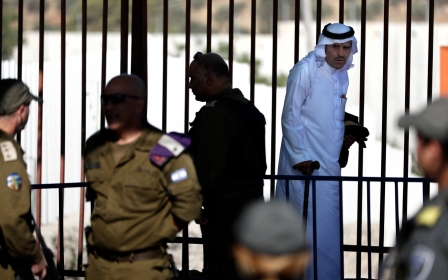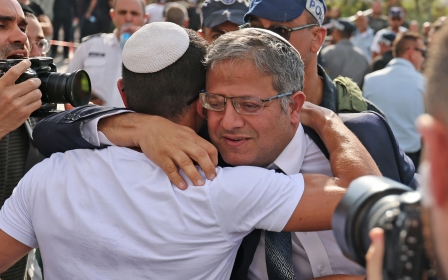'Watershed moment': Over 700 academics equate Israeli occupation with apartheid

More than 700 academics and public figures from Israel, Palestine and other countries have signed an open letter equating Israel’s occupation of the West Bank with apartheid, signalling what supporters say is a "watershed moment" for how Israel’s occupation is viewed.
The letter, which began circulating on Friday, has received around 200 signatures per day with “more coming in, quite literally, by the minute”, Omer Bartov, professor of Holocaust and genocide studies at Brown University and organiser of the letter, told Middle East Eye.
The letter featured 752 signatories at the time of publication.
The authors said there was a direct link between Prime Minister Benjamin Netanyahu’s attempt to overhaul Israel’s judiciary and its illegal occupation of millions of Palestinians in the occupied Palestinian Territories.
“The ultimate purpose of the judicial overhaul is to tighten restrictions on Gaza, deprive Palestinians of equal rights both beyond the Green Line and within it, annex more land, and ethnically cleanse all territories under Israeli rule of their Palestinian population,” the letter said.
New MEE newsletter: Jerusalem Dispatch
Sign up to get the latest insights and analysis on Israel-Palestine, alongside Turkey Unpacked and other MEE newsletters
Notably, the letter made a clear reference to “the elephant in the room: Israel’s long-standing occupation that, we repeat, has yielded a regime of apartheid.”
“There cannot be democracy for Jews in Israel as long as Palestinians live under a regime of apartheid,” it added.
Bartov told MEE that there were a number of Israeli academics who signed the letter who previously would have likely refused to equate the occupation with apartheid. One of the most prominent he identified was Benny Morris, professor emeritus at Ben-Gurion University of the Negev.
“The main change is that Israeli behavior, in the West Bank, but also apparently unfolding vis-a-vis Israel’s Arabs now, has become increasingly brutal over the past few years, and especially more in the past half year. It has made more and more people realise that continued occupation is morally and politically impossible,” he said.
'Watershed moment'
Leading academics such as Peter Beinart from the City University of New York, and Avrum Burg, the former speaker of the Knesset and chairman of the Jewish Agency for Israel also signed the letter.
Academics whose backgrounds span from evolutionary biology at the Hebrew University of Jerusalem to choreography and rabbinical studies at Hebrew College also endorsed the letter. Besides leading academics in Israel, it received support from professors at Yale, Brown, Columbia, and Harvard University in the United States.
On social media platform X, previously known as Twitter, one user anticipated potential accusations of anti-semitism.
"The broad inclusion of so many academics representing a stunningly broad spectrum of distinguished Jewish voices, indicates a watershed moment also in American Jewish views about Israel, and a new willingness by public figures, reflecting the sentiments of the younger generation, to honestly criticise Israeli policies,” Bartov added.
According to a Middle East Eye tally, at least 208 Palestinians have been killed by Israeli fire this year, including 36 children - a rate of nearly one fatality per day.
A total of 172 people have died in the West Bank and East Jerusalem, making 2023 one of the bloodiest years in the occupied Palestinian territories. Another 36 people were killed in the Gaza Strip.
Lior Sternfeld, an associate professor of history and Jewish studies at Penn State University and organiser of the letter, said people were beginning to see a link between the moves by Israel’s far-right government to remake the country’s judiciary and the occupation.
“Now more than ever before, regular middle-way people, intellectuals, and leaders see that unbreakable connection between the occupation and the current political moment,” she told MEE.
“Israelis and Americans who in the past disagreed with the occupation but were willing to look past it are fed up.”
Middle East Eye delivers independent and unrivalled coverage and analysis of the Middle East, North Africa and beyond. To learn more about republishing this content and the associated fees, please fill out this form. More about MEE can be found here.




